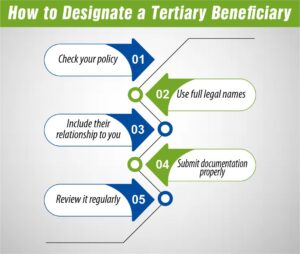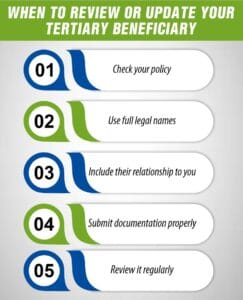Last Updated on: May 5th, 2025
Thank you for reading this post, don't forget to subscribe!- Licensed Agent
- - @M-LifeInsurance
Introduction: Understanding Beneficiaries in Estate Planning
Planning for the future means making smart decisions today—especially when it comes to what happens to your assets after you’re gone. Naming beneficiaries on your life insurance policy or estate plan ensures your money and belongings go to the right people. While most people are familiar with primary and contingent beneficiaries, there’s one more important designation to know: the tertiary beneficiary. Often overlooked, this third-in-line choice plays a key role in protecting your legacy. In this guide, we’ll break down what a tertiary beneficiary is, how it works, and why it matters.
What Is a Tertiary Beneficiary?
A tertiary beneficiary is the person (or entity) who receives your assets only if both your primary and contingent beneficiaries can’t. Think of them as your “third backup.” This could apply to a life insurance policy, retirement account, or estate. If the first two beneficiaries pass away, decline the assets, or can’t be located, the tertiary beneficiary steps in. Including this third level gives you extra peace of mind—knowing your assets won’t be tied up in court or passed to someone you wouldn’t have chosen.
Tertiary Beneficiary Meaning in Insurance Policies
In life insurance, the tertiary beneficiary is the third in line to receive the payout. If your primary (say, your spouse) and contingent (like your adult child) beneficiaries are unavailable, the insurer turns to your tertiary designee. This rarely used—but highly valuable—designation can prevent legal headaches and ensure your benefits stay in the family or go to a trusted party, rather than ending up in probate or reverting to the state.
Tertiary Beneficiary vs. Contingent Beneficiary
Both contingent and tertiary beneficiaries are “backup plans,” but at different levels:
- Primary: First in line (e.g., your spouse)
- Contingent: Second in line (e.g., your adult child)
- Tertiary: Third in line (e.g., your sibling or close friend)
If the primary passes away or declines the benefit, the contingent steps in. If the contingent can’t accept it either, the tertiary receives the payout. This layered structure ensures your intentions are carried out even under the most unexpected circumstances.
What Does “Tertiary” Mean in Insurance?
In insurance and estate planning, “tertiary” simply means third. A tertiary beneficiary is the third person (or entity) in the order of who receives your benefits. It’s like naming an emergency contact’s emergency contact. While it may seem unlikely that all previous beneficiaries would be unavailable, unexpected situations can arise. Having this third level adds an extra layer of security to your financial plan.
Example of a Tertiary Beneficiary
Let’s say you purchase a life insurance policy.
- You name your spouse as the primary beneficiary.
- Your daughter is the contingent beneficiary.
- Your brother is the tertiary beneficiary.
If both your spouse and daughter pass away before you—or can’t accept the payout for any reason—your brother will receive the benefit. If you hadn’t listed him, your policy proceeds might be subject to probate or distributed based on state laws, which may not align with your wishes.
How to Designate a Tertiary Beneficiary
Designating a tertiary beneficiary is simple but important. Here’s how to do it right:
- Check your policy: Some forms allow space for tertiary designations, others may require a written request.
- Use full legal names: Avoid using nicknames or vague labels like “my cousin.”
- Include their relationship to you: This helps avoid confusion.
- Submit documentation properly: Ensure it’s filed with your insurer or estate planner.
Review it regularly: Keep it current as your life and relationships change.

Tertiary Beneficiary in Estate Planning
In estate planning, a tertiary beneficiary can help keep your estate out of probate court. If both your primary and contingent beneficiaries are unavailable and there’s no tertiary, your estate could face delays, legal fees, and unintended distributions. Tertiary designations are especially useful in large or blended families, or when your beneficiaries are elderly or have health concerns.
Tertiary Beneficiary Trusts
Instead of naming a person, you can list a trust as your tertiary beneficiary. This is especially helpful if your desired recipient is a minor, has special needs, or struggles with money management. A trust can hold and manage the assets according to your instructions—like limiting withdrawals or requiring funds to be used for education. This gives you greater control over how your legacy is handled.
Tertiary Beneficiary in a Will: What You Need to Know
Just like insurance policies, wills can include tertiary beneficiaries. This can provide an additional safety net for asset distribution. However, remember:
- Wills go through probate, which can delay things.
- Language matters—be specific and use legally accepted terms.
- It’s best to consult an estate attorney to ensure your will is enforceable and reflects your exact wishes.
Contingent vs. Tertiary Beneficiary: Which One Should You Choose?
You shouldn’t have to choose one over the other—include both if your policy or plan allows. The contingent beneficiary is more likely to receive the benefit, but the tertiary provides an added level of protection. Always select people you trust, who are capable of handling financial responsibilities, and who understand your goals. This is particularly crucial in high-value estates or situations with potential family conflict.
Tertiary Beneficiary Designation by State
Every U.S. state has different rules around beneficiary designations and estate planning. For example:
- Community property states (like California and Texas) may automatically allocate assets to a spouse unless otherwise specified.
- Some states give preference to children if no beneficiaries are named.
- Probate processes vary by jurisdiction.
By naming a tertiary beneficiary, you reduce the risk of these default rules overriding your intentions. Always work with a local estate planning expert to comply with state laws.
When to Review or Update Your Tertiary Beneficiary
Life doesn’t stay the same—and neither should your estate plan. You should review and update your beneficiary designations:
How Much Does Life Isurance Cost?
- After marriage or divorce
- When a child is born or adopted
- Following a death in the family
- After a major financial or health change
Set a reminder to review your entire estate plan at least once a year. Keeping your documents up to date ensures your assets always go where you want them to.

FAQs About Tertiary Beneficiaries
What if I don’t name a tertiary beneficiary?
Your assets could end up in probate or go to someone by default under state law.
Can I name a minor as a tertiary beneficiary?
Yes, but it’s smarter to use a trust to manage the assets until they reach adulthood.
Is a tertiary beneficiary designation legally binding?
Yes—if it’s properly documented with the insurer or included in your estate plan.
Can I name more than one tertiary beneficiary?
Absolutely. You can list multiple tertiary beneficiaries and assign each a percentage.
Conclusion: Why Naming a Tertiary Beneficiary Matters
Naming a tertiary beneficiary isn’t just a technicality—it’s a smart way to protect your legacy. It ensures that even if your primary and contingent beneficiaries can’t receive your assets, your backup plan stays intact. Whether you’re managing a simple policy or a complex estate, this third designation gives your loved ones clarity and reduces the chances of legal delays. The best estate plans prepare for every possibility—and that’s exactly what a tertiary beneficiary helps you do.
Final Tip: Work with a qualified estate planner or insurance advisor to make sure all your beneficiary designations are up-to-date, clearly documented, and legally sound.

Joyce Espinoza, Expert Life Insurance Agent
Joyce Espinoza is a trusted life insurance agent at mLifeInsurance.com. She’s been in the insurance industry for over ten years, helping people, especially those with special health conditions to find the right coverage. At MLife Insurance, Joyce writes easy-to-understand articles that help readers make smart choices about life insurance. Previously, she worked directly with clients at Mlife Insurance, advising nearly 3,000 of them on life insurance options.




